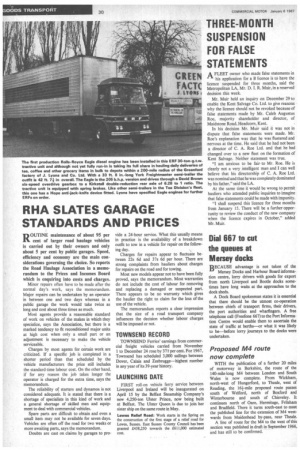RHA SLATES GARAGE STANDARDS AND PRICES
Page 32

If you've noticed an error in this article please click here to report it so we can fix it.
ROUTINE maintenance of about 95 per cent of larger road haulage vehicles is carried out by their owners and only about 5 per cent by public garages. Speed, efficiency and economy are the main considerations governing the choice. So reports the Road Haulage Association in a memorandum to the Prices and Incomes Board which is enquiring into costs and charges.
Minor repairs often have to be made after the normal day's work, says the memorandum. Major repairs can be undertaken by an operator in between one and two days whereas in a public garage the work would take twice as long and cost about three times as much.
Most agents provide a reasonable standard of work on vehicles of the makes in which they specialize, says the Association, but there is a marked tendency to fit reconditioned major units at high cost when only a small part or an adjustment is necessary to make the vehicle serviceable.
Charges by most agents for certain work are criticized. If a specific job is completed in a shorter period than that scheduled by the vehicle manufacturers the price still includes the standard-time labour cost. On the other hand, if for any reason the job takes longer the operator is charged for the extra time, says the memorandum.
The reliability of starters and dynamos is not considered adequate. It is stated that there is a shortage of specialists in this kind of work and a general shortage of skilled men and equipment to deal with commercial vehicles.
Spare parts are difficult to obtain and even a small item may not be available for seven days. Vehicles are often off the road for two weeks or more awaiting parts, says the memorandum.
Doubts are cast on claims by garages to pro
vide a 24-hour service. What this usually means in practice is the availability of a breakdown outfit to tow in a vehicle for repair on the following day.
Charges for repairs appear to fluctuate between 22s 6d and 37s 6d per hour. There are strong complaints from hauliers about charges for repairs on the road and for towing.
Most new models appear not to have been fully proved, says the memorandum. Most warranties do not include the cost of labour for removing and replacing a damaged or suspected part. There appears to be no warranty which gives the haulier the right to claim for the loss of the use of the vehicle.
The memorandum reports a clear impression that the size of a road transport company influences the decision whether labour charges will be imposed or not.
TOWNSEND RECORD
TOWNSEND Ferries' earnings from commercial freight vehicles carried from November I to December 24 rose by 37 per cent. For 196'7, Townsend has scheduled 3,000 sailings between Dover, Calais and Zeebrugge—highest number in any year of its 39-year history.
LAUNCHING DATE
FIRST roll-on vehicle ferry service between Liverpool and Ireland will be inaugurated on April 15 by the Belfast Steamship Company's new 4,250-ton Ulster Prince, now being built at Belfast. The Ulster Queen is due to join her sister ship on the same route in May.
Lewes Relief Road: Work starts in the Spring on the construction of the first stage of a relief road for Lewes, Sussex. East Sussex County Council has been granted £458,250 towards the £611,000 estimated cost.












































































































